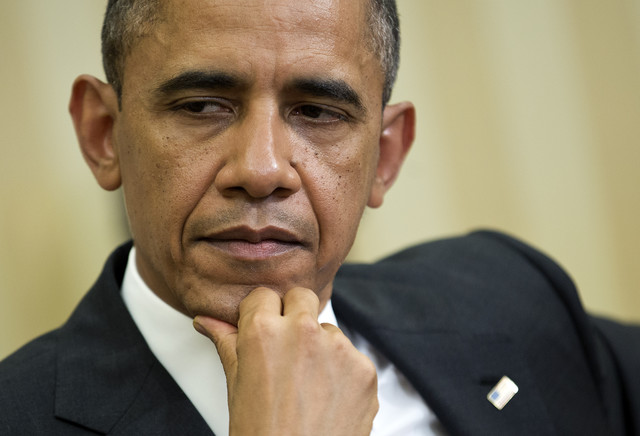
From Fred Hiatt, Washington Post: [T]he dominant impression among foreign officials is of a policy of retrenchment. They see a steady reduction in the size of U.S. armed forces that will mean less ability to intervene and influence. They watched Obama withdraw all troops from Iraq, failing to negotiate an agreement that would have preserved some U.S. role in that now-unraveling country. They see him preparing to withdraw most — or all, his spokesman has said; the size of any residual force has not been announced — troops from Afghanistan.
The president boasts of his intervention to save the people of Benghazi from attack in 2011 and drive out the dictator Moammar Gaddafi, but the Libyan operation turned out to be a case study in the policy of limitations. Obama acted only when pressed by French and British allies and then insisted on withdrawal instead of committing to help a new government establish itself. The predictable result is an unstable country, riven by militias and posing an increasing danger to its neighbors through the spread of arms.
Syria is the prime laboratory of U.S. disengagement, and the experiment is not going well. From a peaceful democratic uprising two years ago to a civil war in which U.S. assistance could have been decisive last year, the conflict has degenerated into something so savage that it’s no longer clear what, if anything, might help.
The White House seems to assume that, whatever the lofty aspirations of Berlin, Obama’s governing approach is what Americans want and the country can afford. While acknowledging “very real and legitimate” humanitarian interests in Syria — some 80,000 people have been killed, and millions have lost their homes — Obama recently said his “bottom line” has to be “what’s in the best interest of America’s security.” Judging by conversations with his team, there’s also an assumption that such assessments were clear during the Cold War but are hopelessly more complex now.
But those judgments have never been easy. During the Cold War, too, Americans fought bitterly over the size of the defense budget, the wisdom of interventions and the morality of supporting unsavory but friendly dictators. Over the decades the country made terrible mistakes overseas. But U.S. engagement and influence also helped to gradually open the world to more democracy and more prosperity. . . .
In 2012, according to Freedom House, three countries became freer and more democratic, while 27 became less so — the seventh consecutive year of more declines than gains. That’s an unprecedented streak in the wrong direction — and not consistent with long-term, hard-headed U.S. interests. (photo: Joshua Roberts/Bloomberg)
Image: bloomberg%205%2020%2013%20Obama.jpg
